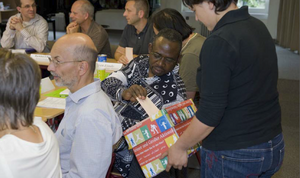
The high concentration of social problems in some neighbourhoods can contribute to a gradual loss of basic standards of living collectively. These neighbourhoods need a special support system to ensure that both the neighbourhood and the people living there have equal chances for development. Everywhere in Berlin, the citizens should have equal opportunities for their lives. Thus, the government of Berlin has implemented the Neighbourhood Management programme to prevent the development of social segregation and urban separation over time.
The Neighbourhood Management programme is part of the national initiative "Neighbourhoods with Special Development Needs – Social City". The programme aims to support the most disadvantaged neighbourhoods, which are hit the hardest by unfavourable social and economic developments. A key aspect of this is preventing a ‘downward spiral’ in these neighbourhoods, which would further hinder prospects for residents. The programme also seeks to counteract discrimination against population groups and/or social segregation.
The Social City programme has five core fields of action:
• Education, training and youth
• Employment and local economy
• Neighbourhood (culture, integration, health)
• Public space
• Participation, networking and the involvement of partners
Moreover, the Social City programme is more than just renovation - it's a 'living space': empowering communities and promoting integration, education and employment. The underlying idea of the Social City programme is that the neighbourhoods themselves become the main actors in their own development, to improve the living conditions for residents. As such, supporting resident and stakeholder initiatives is essential to create ownership of this kind of positive self-development.
The programme pursues various objectives for the neighbourhoods involved. These include:
• creating the prospect of sustainable development for these neighbourhoods
• strengthening self-reliance and commitment among residents and stakeholders
• recognition and exploitation of local resources and potential
• pooling of resources by strengthening networking among different stakeholders
• encouragement of interdisciplinary dialogue and activity
There is a clear focus on motivating people and conducting participatory activities, complemented by raising awareness and mobilisation activities at the neighbourhood level to encourage social stability within these neighbourhoods.